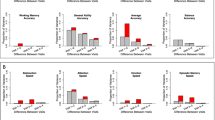Abstract
Clinical psychologists, school psychologists, and clinical neuropsychologists are often involved in conducting serial assessments of an individual for a variety of reasons. These may include assessing intellectual development (e.g., mental retardation), monitoring the progression of a disease process (e.g., dementia), documenting recovery of function following insult (e.g., stroke), or evaluating the therapeutic efficacy of a specific treatment (e.g., medications). In these instances, practitioners are often faced with a variety of questions when attempting to interpret the changes in an individual’s performance across assessments. For example, how much fluctuation in test performance may be due to the psychometric characteristics of this test (e.g., reliability)? Is the observed improvement/decline an artifact of statistical regression? To what extent is this patient’s performance improved merely by prior exposure to the testing material? To what extent is the patient’s performance across time affected by demographic variables, such as age, gender, or education? Do different disease processes (e.g., traumatic brain injury, Alzheimer’s disease, and stroke) impact serial performance in different ways? When administering intellectual measures across time, how important are variables inherent in the testing situation, such as test-retest interval or test sophistication? These are commonplace questions; however, resources to assist practitioners when interpreting the results of serial assessments have been lacking. After a brief review of the history of intelligence tests and the role of intelligence testing in neuropsychological evaluations, several of the above mentioned questions concerning serial assessment will be addressed.
Access this chapter
Tax calculation will be finalised at checkout
Purchases are for personal use only
Preview
Unable to display preview. Download preview PDF.
Similar content being viewed by others
Author information
Authors and Affiliations
Editor information
Editors and Affiliations
Rights and permissions
Copyright information
© 2000 Springer Science+Business Media New York
About this chapter
Cite this chapter
McCaffrey, R.J., Duff, K., Westervelt, H.J. (2000). Introduction. In: McCaffrey, R.J., Duff, K., Westervelt, H.J. (eds) Practitioner’s Guide to Evaluating Change with Intellectual Assessment Instruments. Critical Issues in Neuropsychology. Springer, Boston, MA. https://doi.org/10.1007/978-1-4615-4279-7_1
Download citation
DOI: https://doi.org/10.1007/978-1-4615-4279-7_1
Publisher Name: Springer, Boston, MA
Print ISBN: 978-0-306-46416-4
Online ISBN: 978-1-4615-4279-7
eBook Packages: Springer Book Archive




